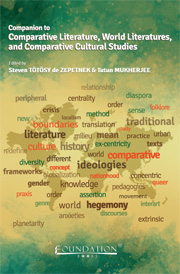Book contents
- Frontmatter
- Contents
- Introduction to the Companion to Comparative Literature, World Literatures, and Comparative Cultural Studies
- PART 1 Theories of Comparative Literature, World Literatures, and Comparative Cultural Studies
- PART 2 Comparative Literature in World Languages
- African Literatures as World Literatures
- Comparative Literature in Arabic
- Comparative Poetics in Chinese
- Comparative Literature in French
- Comparative Literature in German
- Comparative Literature in Iberian Spanish and Portuguese
- Comparative Literature in Indian Languages
- Comparative Literature in Italian
- Comparative Literature in Latin American Studies
- Comparative Literature in Russian and in Central and East Europe
- Comparative Literature in the United States
- PART 3 Examples of New Work in Comparative Literature, World Literatures, and Comparative Cultural Studies
- PART 4 Multilingual Bibliography of Books in Comparative Literature, World Literatures, and Comparative Cultural Studies
- Index
Comparative Literature in German
from PART 2 - Comparative Literature in World Languages
Published online by Cambridge University Press: 05 April 2014
- Frontmatter
- Contents
- Introduction to the Companion to Comparative Literature, World Literatures, and Comparative Cultural Studies
- PART 1 Theories of Comparative Literature, World Literatures, and Comparative Cultural Studies
- PART 2 Comparative Literature in World Languages
- African Literatures as World Literatures
- Comparative Literature in Arabic
- Comparative Poetics in Chinese
- Comparative Literature in French
- Comparative Literature in German
- Comparative Literature in Iberian Spanish and Portuguese
- Comparative Literature in Indian Languages
- Comparative Literature in Italian
- Comparative Literature in Latin American Studies
- Comparative Literature in Russian and in Central and East Europe
- Comparative Literature in the United States
- PART 3 Examples of New Work in Comparative Literature, World Literatures, and Comparative Cultural Studies
- PART 4 Multilingual Bibliography of Books in Comparative Literature, World Literatures, and Comparative Cultural Studies
- Index
Summary
Abstract: In his article “Comparative Literature in German” Oliver Lubrich discusses the status quo of the discipline against the backdrop of recent debates about the future of literary theory and comparative literature as a global discipline. Starting with the as-of-yet rarely explored history of comparative studies under national socialism, Lubrich sketches the development of the discipline after World War II with particular focus on the work of Peter Szondi. Further, Lubrich reflects on selected areas of study including German colonialism, travels to fascist countries, postsocialist literatures, and (im)migrant writing. Brief mention is made about German-language comparative literature in Austria and Switzerland.
Introduction
In recent years some scholars stated—not for the first time—that comparative literature is dead. Gayatri Chakravorty Spivak's Death of a Discipline and Terry Eagleton's After Theory epitomize this provocative position. Eagleton takes a polemical look at the literary and cultural theories of the last decades and laments their “postmodern” disinterest in politics. He demands a repoliticizing of theory and, consequently, of the disciplines it inspires. In the past years, the most widely discussed development in the humanities, postcolonialism, has intended to do just that. The study of (post)colonial literature is both political and comparative because it treats cultures in their (conflicting) relationship to each other—e.g., conquest, colonization, domination, (im)migration. Spivak's argumentation for the renewal of comparative literature with a postcolonial grounding is about bringing together comparative literature with area studies and thereby forging an alliance between the humanities and the social sciences.
- Type
- Chapter
- Information
- Companion to Comparative Literature, World Literatures, and Comparative Cultural Studies , pp. 269 - 283Publisher: Foundation BooksPrint publication year: 2014

